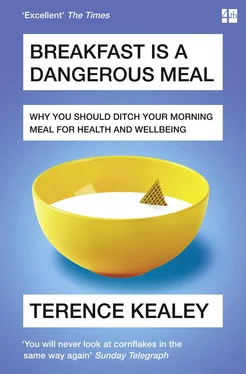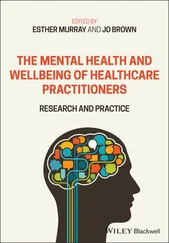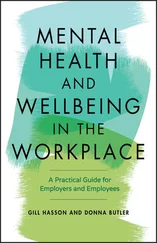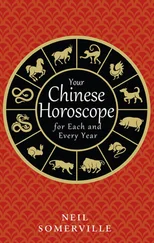Plasma glucose levels in type 2 diabetics who eat breakfast.
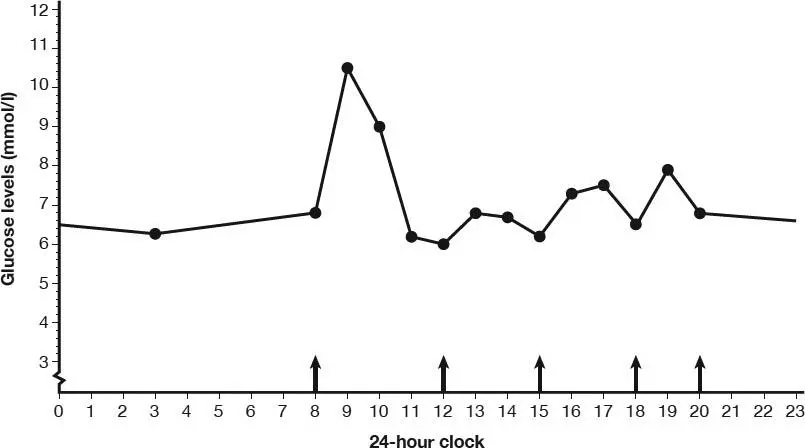
13 patients were studied on four occasions, and their results averaged. The arrows indicate that breakfast was served at 8.00, lunch at 12.00, a snack at 15.00, dinner at 18.00 and supper at 20.00.
Now look at Figure 1.2B. On the days the diabetics ate no breakfast, they enjoyed mornings of beautifully falling blood glucose levels. On those days they ate bigger lunches and dinners, so their post-lunch and post-dinner rises were higher than on the days they did eat breakfast, but those rises were gentler and therefore safer than the post-breakfast spikes they had thus avoided. (These subjects also ate two snacks a day, but that doesn’t change this analysis.)
FIGURE 1.2B
Plasma glucose levels in type 2 diabetics who do not eat breakfast.
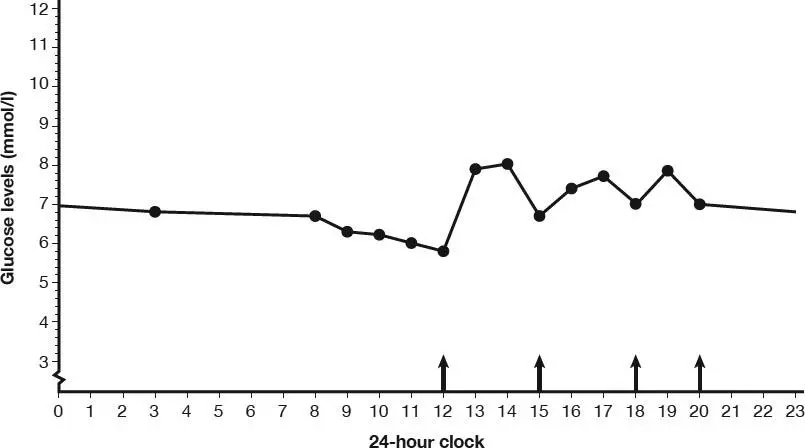
13 patients were studied on four occasions, and their results averaged. Lunch was served at 12.00, a snack at 15.00, dinner at 18.00 and supper at 20.00.
Professor Christiansen’s data and my own experience with my glucometer are, therefore, comparable, and Professor Christiansen has confirmed my unexpected finding that, for type 2 diabetics at least, breakfast is a dangerous meal. As readers of Professor Christiansen’s paper will discover, he was equally surprised by the finding, and like me he concluded that type 2 diabetics should skip breakfast.
So, why was I told to eat breakfast?

Box 1: Glucometers and type 2 diabetes
Normally doctors won’t give glucometers to patients with type 2 diabetes (only type 1s get them). Here is the recommendation from NICE (the National Institute for Health and Care Excellence) which is the quango that advises doctors on how to treat their patients: ‘Do not routinely offer self-monitoring of blood glucose levels for adults with type 2 diabetes.’ 10
NICE gives this advice because of research that suggests that self-monitoring does not benefit type 2 diabetics, 11but I don’t trust that research. Consider slimming and self-weighing. It makes sense that people who weigh themselves regularly would eat less and would lose more weight than people who do not weigh themselves, and although some researchers disagree, 12most researchers find exactly that. 13Equally, people who use fitness trackers to monitor their own exercise would be expected to walk more every day, which is what researchers find. 14Correspondingly, I would expect diabetics who monitor their own blood glucose levels also to improve their control.
As would Diabetes UK, and though it may be unsound on breakfast, it is a superb patients’ advocate, and it is shocked that type 2s are not routinely given glucometers. Diabetes UK admits that patients who self-monitor will ‘commonly’ fail to act on the results of their glucometer readings (thus rendering the blood tests futile), but that failure, it explains, arises only because of patients’ ‘lack of education in how to interpret them’. That lack of education, moreover, has not been helped by ‘a lack of interest in the results from health care professionals’. Consequently, Diabetes UK says, the self-monitoring of blood glucose levels has failed only because ‘the professionals expect the patients to self-manage’ while the ‘patients expect the health care professionals to use the results.’ 15
But I am not only a researcher who has specialised in the biochemistry of glucose and fats, I am also a medical doctor, so I needed no education in interpreting blood glucose levels, and I was grateful for the glucometer my doctor proffered, which allowed me to take control of my diabetes and which also allowed me to discover that the conventional advice was simply wrong. Yet even for non-biochemists and non-doctors the necessary level of education is actually modest, and it should be extended to all patients with type 2 diabetes, so that they too can optimise their diets. It was thanks to his pioneering use of the personal glucometer that the great Dr Bernstein streaked decades ahead of the curve in advocating low-carbohydrate diets for type 1 diabetics, 16and now we need a Dr Bernstein for type 2s.
Glucometers and their strips can be bought at any pharmacy – no prescriptions are necessary – so if you have type 2, and if you do not have a glucometer, let me urge you to buy your own; and in the meanwhile, for want of anything better, let this book be your education. (The real cost of blood glucose measurements comes, incidentally, not from the purchase of the glucometer but from the test strips. I use roughly sixty strips a month, which costs me about £25 a month, which is cheap at the price.)


The Dubious Advocates of Breakfast

The glorification of breakfast
Early one morning, some 3,000 years ago, a Greek army idled while two of its generals argued. As Homer recounts in Book 19 of The Iliad , Achilles wanted to attack Troy at dawn, but Odysseus urged him not to send his men ‘to fight the Trojans fasting, for the battle will be long and furious, so first get your men to eat bread and wine by the ships’. 1
Odysseus won the argument, and breakfast was duly served to the troops. Achilles refused his portion but, fortunately, the goddess Athena ‘dropped nectar and ambrosia into Achilles, so hunger wouldn’t weaken him’. Greek soldiers believed in breakfast, as apparently did everybody in Homeric Greece, and Book 16 of The Odyssey opens with ‘Back at the hut, Odysseus and the noble swineherd had lit a dawn fire and were making breakfast.’ 2
By the classical era in Greece, around 500 bc (bce), breakfast seems to have consisted of barley bread or pancakes, sometimes dipped in wine, sometimes complemented by figs or olives. The Romans ate a similar breakfast, around dawn, of bread, cheese, olives, salad, nuts, raisins and perhaps cold meat. The Roman army, though, fed its soldiers a hot breakfast of porridge, similar to polenta, made from roasted spelt wheat or barley that was then pounded and cooked in boiling water.
In their patterns of eating the Greeks and Romans were apparently not unusual, and Heather Anderson opened her 2013 book Breakfast: A History with: ‘Throughout history, most people partook of a simple breakfast … ample written record supports the notion that ancient Romans had a three-meals-a-day (plus afternoon snack) routine similar to that of today’s United States and Europe.’ 3
But that routine was not imperishable, and it appears that for a thousand years after the fall of the Roman Empire breakfast was skipped in polite Europe. Thus Charlemagne (748–814) was described as being typical in not eating breakfast, 4while 700 years later a King of France, Francis I (1494–1547), was still saying that people should ‘rise at five, dine at nine, sup at five, and couch at nine’, 5and a generation after that the priest William Harrison was reporting in his 1577 Description of England that ‘the nobility, gentry and students do ordinarily go to dinner at 11 and to supper at 5,’ 6which was reiterated as late as 1602 by Dr Edmund Hollings, the Renaissance dietician. 7So, what happened to breakfast after the fall of the Roman Empire?
Читать дальше
